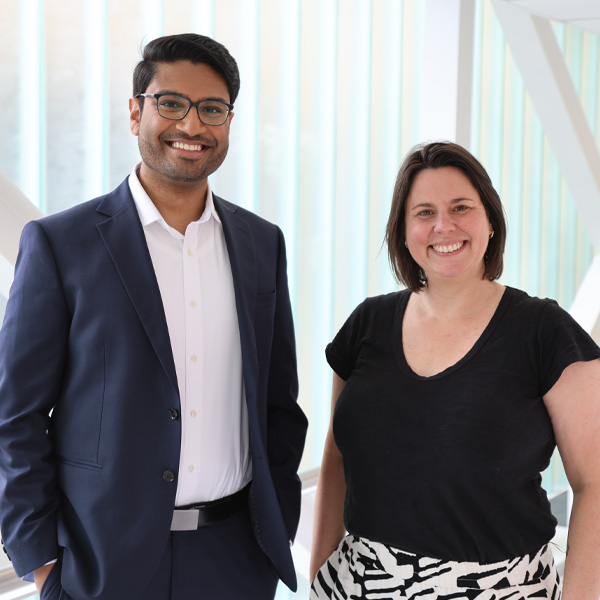New treatments for preterm babies
By Rob Clancy, staff writer
The combined skills of Professors Claudia and Marcel Nold are bringing new treatments for preterm babies, from laboratory discovery to clinical trials in Monash Children’s Hospital’s Neonatal Intensive Care Unit (NICU).
In business it’s called vertical integration – when the same organisation controls multiple stages of the production process. The medical research equivalent of vertical integration is rare – which is why Hudson Institute is fortunate to have husband and-wife team Professor Claudia Nold (Research Group Head, Interventional Immunology in Early Life Diseases) and Professor Marcel Nold (Research Group Head, Interventional Immunology in Early Life Diseases, and Professor, Paediatrics Monash Health), who are engaged in a hugely beneficial working partnership.
Controlling inflammation in preterm babies
With a background in pharmacology, Claudia spends her time searching for new ways to safeguard the health of tiny infants – aiming to prevent bronchopulmonary dysplasia (BPD), necrotising enterocolitis, and other illnesses, as well as collaborating on prevention of cerebral palsy. She jointly heads the Interventional Immunology in Early Life Diseases Research group.
Meanwhile Marcel, a clinician-scientist, splits his time between the lab and Monash Children’s Hospital, where he’s hands-on with babies like Max (see story below) and their families during their early difficult days.
These pioneering collaborators are now close to achieving something once thought impossible. Based on decades of work, they are within reach of a treatment to control inflammation in preterm babies that can cause devastating heart, lung, gut and brain conditions.
Preterm inflammatory response identified
In 2022, they identified the specific inflammatory responses that drive illnesses of prematurity and revealed several risk factors both before and after birth.
Marcel explains their discovery, published in Science Translational Medicine: “Type-2- polarised inflammation drives cardiopulmonary disease in these babies, allowing us to now work on ways to control inflammation in preterm babies and avoid the damage it wreaks.”
“It’s one of those ‘eureka’ moments,” says Claudia. “Like when we discovered the anti-inflammatory function of one of the molecules we were investigating, which we now are developing into a drug.”
They also further advanced their clinical trial of the anti-inflammatory drug anakinra, and they are cautiously positive about the results.
Max and Susana
A little over 27 weeks into her second pregnancy, all in the space of a couple of days, Susana went from planning months ahead for her baby’s arrival to giving birth and becoming part of medical history.

Baby Max arrived small and vulnerable, so when doctors in Monash Children’s Hospital’s neonatal unit asked if she would like her newborn son to be the first participant in a trial of a new treatment to keep preterm babies healthy, she quickly said “yes”.
The drug anakinra has been used to prevent dangerous inflammation for decades, but never in preterm newborns until this trial.
“We were aware of the dangers to vital organs such as lungs, heart, gut and brain for a baby born so early – it was daunting but I’m proud that we took part. We’ve brought some good to the world,” Susana said.
Now, 10 months on, Max is making good progress and recently even had his first overseas trip – to meet his grandparents for the first time. But even before he got on the plane, little Max had travelled a long way.
Collaborators | 13 University of Technology; Australian Synchrotron, Centenary Institute; CSL Limited, Hunter Medical Research Institute; Mater Research Institute; Mercy Hospital for Women; Monash Children’s Hospital; Monash University; Murdoch Children’s Research Institute; Royal Women’s Hospital; University of Adelaide; University of Melbourne; Victorian Heart Institute; Helios HSK, Germany; National Cerebral and Cardiovascular Center Research Institute, Japan; St. Vincent’s Hospital, Germany.
Funders | Australian Synchrotron; CSL Ltd; Jack Brockhoff Foundation; National Heart Foundation; NHMRC; Rebecca L Cooper Foundation
Contact us
Hudson Institute communications
t: + 61 3 8572 2761
e: communications@hudson.org.au
In this article
About Hudson Institute
Hudson Institute’ s research programs deliver in three areas of medical need – inflammation, cancer, women’s and newborn health. More
Hudson News
Get the inside view on discoveries and patient stories
“Thank you Hudson Institute researchers. Your work brings such hope to all women with ovarian cancer knowing that potentially women in the future won't have to go through what we have!”









